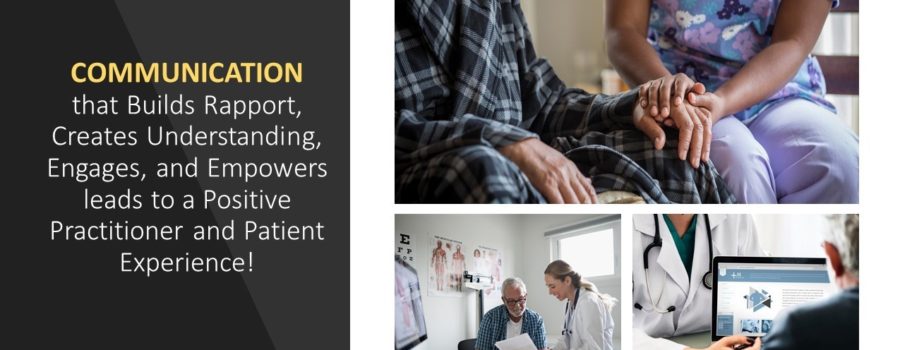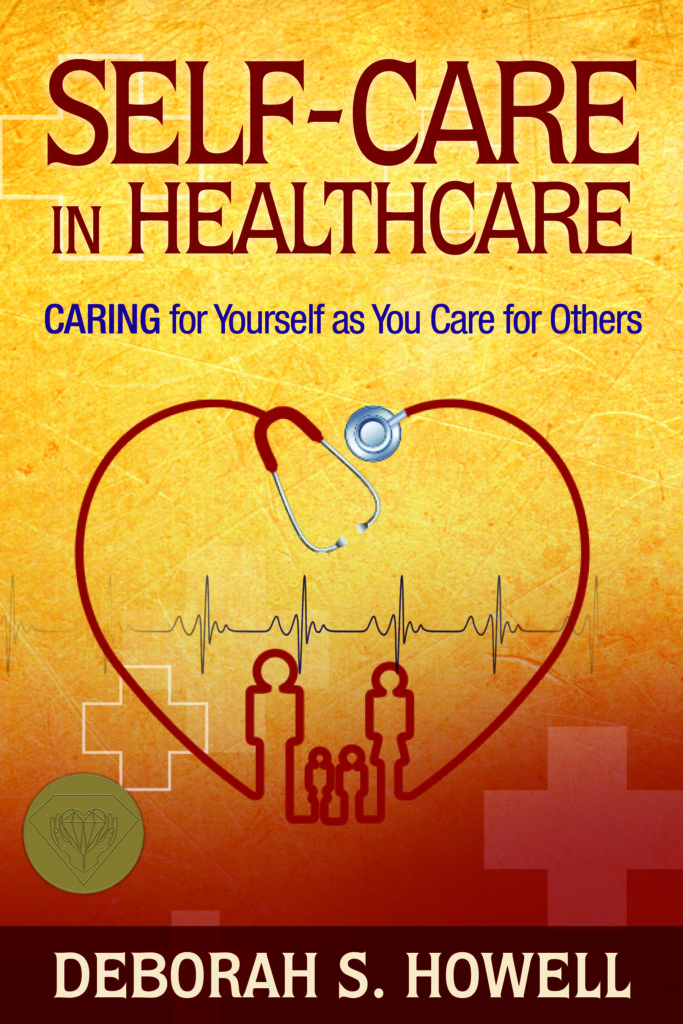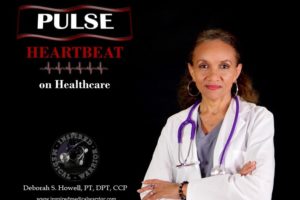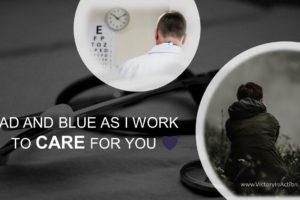At the start of our Physical Therapy session my patient said to me, “Ms. Deborah, I have to talk to you! What am I supposed to do?” I asked, “What’s going on?” Patient replied, “I am upset with the negativity, no one listens or cares about how I feel. I am in pain all the time. I am confused and frustrated.” At the start of our Physical Therapy session my patient said to me, “Ms. Deborah, I have to talk to you! What am I supposed to do?” I asked, “What’s going on?” Patient replied,” I am upset with the negativity, no one listens or cares about how I feel. I am in pain all the time. I am confused and frustrated.”
The back story is that this patient just had a recent follow-up doctor visit and has degenerative changes in several joints that potentially need replacement, however, the patient has many chronic health conditions to include a history of blood clots and circulation issues that place this person at high risk for ANY surgery. Factors that complicate this patient’s understanding is a prior head injury, mental illness diagnosis, health literacy concerns, inconsistency of information, several specialty practitioners that do not communicate with each other allowing for variations in opinions, oversight, and pain management, and the patient’s feeling of not being heard. What to do?
Several months ago, this patient’s therapy was going well, UNTIL something was said by the orthopedic surgeon that changed the expectation of this patient and reversed the course of positive progression that was being made in physical therapy. This patient was told something that led to a belief that surgery could be a viable option and then became fixated on that belief. Over these past several months, this patient has become progressively confused, frustrated, and overwhelmed and only knows that there is no satisfactory relief from the pain, and this affects therapy participation and tolerance, and quality of life. What I know from this situation is that something was said where the patient felt hopeful to have surgery, however, this was not realistic from the start and now, the patient feels let down and discouraged, doesn’t know what or who to believe. This patient’s perspective focuses on the replaying thought and belief that surgery is “mandatory” and will “fix” the problem. That belief is part of the problem because surgery is only a “part” of the solution, the smallest part with the biggest risk. Even after our conversation, this patient does not understand the fullness and severity of the risks, and therefore I know that repetition of education and encouragement around lifestyle changes and adjustments, and continued engagement and empowerment are essential components to the ongoing plan of care.
I listened empathically and talked honestly to this patient and made a point to be inclusive of all personal factors, feelings and concerns and acknowledged the medical providers involved to craft a comprehensive yet understandable explanation of the situation and the posed options and risks, and the “WHY” behind them. This patient expressed thankfulness for me “taking time to explain in a way to help understand.”
Many of my patients have some form of head injury and are living their lives after a Traumatic Brain Injury (TBI) or a Stroke. They are all dealing with varying levels of pain, anxiety, and depression. Prior to their diagnosis, most of them have had some prior traumatic experience and have acknowledged their inability to effectively deal with stress, have suppressed their emotions, and/or used drugs, alcohol, or smoking to cope with life stressors. Taking that baseline measure into account, are we as a healthcare system, as healthcare providers consistent with taking time to gauge our patients’ understanding and their health literacy? Are we engaging, empowering, and supporting patients in proper self-care and self-assessment, teaching effective strategies for their own health care and self-care management? Do we effectively assess their understanding of their medical/health condition and options? Do we consider their questions, fears, and concerns? Are we forthright and empathetic, do we have patience and clarity with our descriptions and explanations of benefits and risks or are we avoiding difficult or time-consuming discussions?
Communicating with our patients in a way that helps create a level of understanding can also help to empower them with knowledge and a sense of “can do” while encouraging positive feelings of being supported and having a trusted ally in the decision-making process. It is important that patients understand the pros and cons that accompany medical decisions, and that they acknowledge personal responsibility for owning their decisions and know the factors involved that best support and facilitate the desired outcomes and life-style changes. It’s important to talk about what they can do, are willing to do and assist them with integrating into a self-care plan with the addition of some type of accountability partnering through family, friends or community support and subsequent follow-up.
Patient care and the patient experience is both complex and dynamic and has many moving parts! Patients have lost trust and confidence, and practitioners have become detached and desensitized, even cynical at times. Healthcare is a business, and everyone is a customer and consumer in this business. At the end of the day, whether you are a patient, practitioner, business owner, hospital, stake holder, or insurance company, I believe the big “running” question and desired outcome remains, “What’s in it for me?” What’s my Return on Investment (ROI)?
While patient care becomes ever more demanding, the healthcare system continues to change and revise its processes, policies, and procedures, not to mention budget cuts. The increase in automated and impersonal processes are making navigation and access much more difficult and time consuming and are quite challenging even for those of us who are working in the system let alone an aging population who are not tech savvy, people who are cognitively impaired or mentally ill, and who are sick and overwhelmed because of their medical condition.
It is clear to me and many who I have had conversations with that core values are lost… lost in the delivery, translation, and genuine regard for the true meaning and sensitivity that’s inherent to sincere and compassionate quality care. The GAP is wide and those significantly benefiting from these system changes are far removed from the TOUCH POINTS of direct care.
Everyone has a part to play in Healthcare Delivery and Reform. The personal COST and cost EFFECTIVENESS of Professional Caregiving and Healthcare Delivery requires a New and MINDFUL MODEL that truly measures, represents, and supports the practitioner and patient experience, satisfaction, and safety.
Can we set-up for WIN-WIN outcomes and experiences, have positive and rewarding returns on our investment of time, energy, and attention? Yes, we can! Tuning-in and being in our heart to care begins the communication process before a word is ever spoken.
Communication occurs both verbally and non-verbally and is vital to the effectiveness of healthcare delivery and outcomes, greatly impacting the health, well-being and safety of our patients, and the healthcare environment. How we communicate and our choice of words matter. We can learn to communicate in a way that fosters peace of mind and heart, conveying CARE and CONCERN in the most sensitive and challenging of times and situations. Keep in mind that self-awareness, attitude, presence, pace and tone of voice, kindness, and our own self-care factor into communication.
“I support Healthcare Professionals and Healthcare Facilities & Organizations to Cultivate Inner Resilience and Create Conscious, Caring, and Regenerative Cultures and Practices.”
Dr. Deborah Howell
Physical Therapist, Coach, Author, Veteran
Dr. Deborah Howell is a Licensed Physical Therapist, Chronic Care Professional Health Coach, Life Coach, HeartMath® 1:1 Provider and Trauma-Sensitive Practitioner, Bestselling Author, and Navy Veteran. She is the Founder and CEO of Victory in Action LLC and Heart First Medicine Academy specializing in Heart-Focused and Conscious Leadership, Empowerment, and Resilience training.
Announcements:
Upcoming Fall Classes and Lunch & Learn Sessions will be held LIVE in the Academy.
Join Heart First Medicine Academy today!






